人教版英语七年级上册Unit6知识点总结
人教版七年级英语上册Unit6短语、句型、知识点总结知识分享
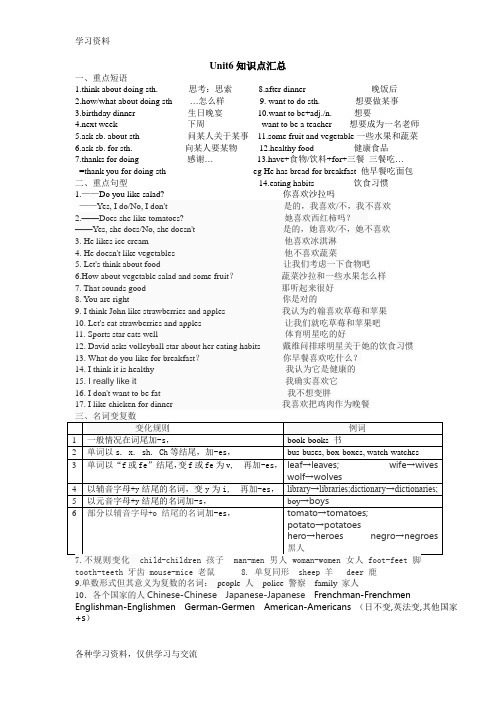
7.That sounds good那听起来很好
8.You are right你是对的
9. I think John like strawberries and apples我认为约翰喜欢草莓和苹果
10. Let's eat strawberries and apples让我们就吃草莓和苹果吧
11. Sports star eats well体育明星吃的好
12. David asks volleyball star about her eating habits戴维问排球明星关于她的饮食习惯
13.What do吃什么?
14.I think it is healthy我认为它是健康的
15.I really like it我确实喜欢它
16.I don't want to be fat我不想变胖
17. I like chicken for dinner我喜欢把鸡肉作为晚餐
三、名词变复数
变化规则
例词
1
一般情况在词尾加-s,
2.——Does she like tomatoes?她喜欢西红柿吗?
——Yes, she does/No, she doesn't是的,她喜欢/不,她不喜欢
3. He likes ice cream他喜欢冰淇淋
4. He doesn't like vegetables他不喜欢蔬菜
5. Let's think about food让我们考虑一下食物吧
library→libraries;dictionary→dictionaries;
人教版七年级英语上册 Unit 6 知识归纳(含答案)
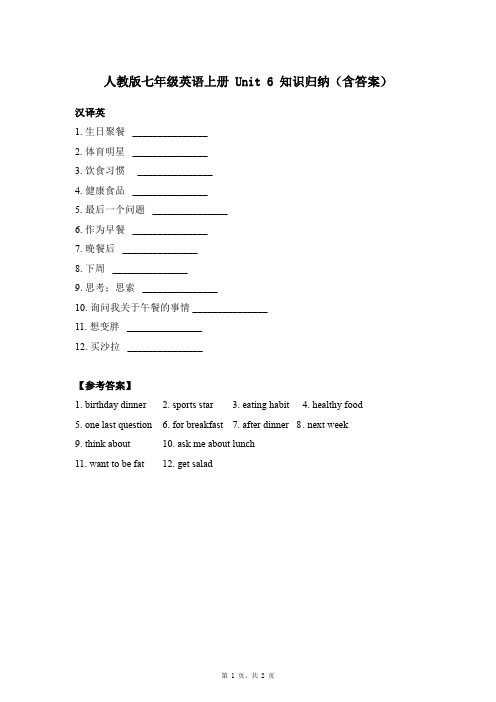
人教版七年级英语上册 Unit 6 知识归纳(含答案)汉译英1.生日聚餐_______________2.体育明星_______________3.饮食习惯_______________4.健康食品_______________5.最后一个问题_______________6.作为早餐_______________7.晚餐后_______________8.下周_______________9.思考;思索_______________10.询问我关于午餐的事情_______________11.想变胖_______________12.买沙拉_______________【参考答案】1. birthday dinner2. sports star3. eating habit4. healthy food5. one last question6. for breakfast7. after dinner8. next week9. think about10. ask me about lunch11. want to be fat12. get salad汉译英1. Cindy认为她妹妹喜欢冰激凌。
____________________________________ 2.那么咱们喝牛奶吧!____________________________________ 3. Jack喜欢什么蔬菜?____________________________________ 4.——咱们早饭吃什么?——水果沙拉怎么样?____________________________________ ____________________________________ 5.——Tom喜欢梨吗?——不,他不喜欢。
____________________________________ ____________________________________ 6.——你们午饭后吃草莓吗?——是的,我们吃。
人教版七年级上册英语知识点全第六单元unit6知识点
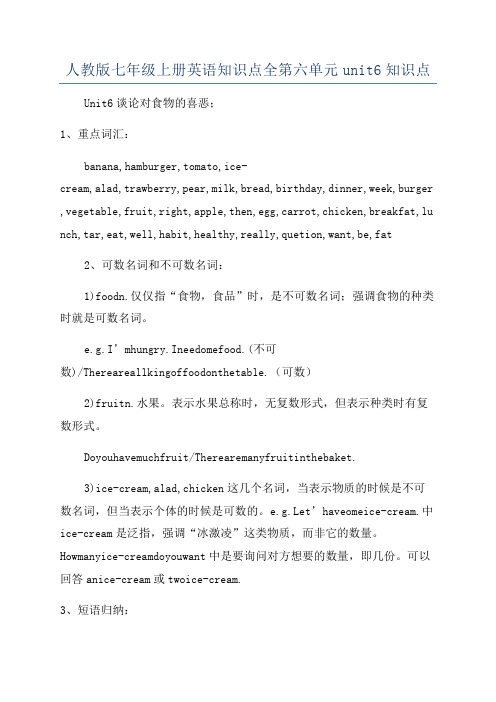
人教版七年级上册英语知识点全第六单元unit6知识点Unit6谈论对食物的喜恶;1、重点词汇:banana,hamburger,tomato,ice-cream,alad,trawberry,pear,milk,bread,birthday,dinner,week,burger ,vegetable,fruit,right,apple,then,egg,carrot,chicken,breakfat,lu nch,tar,eat,well,habit,healthy,really,quetion,want,be,fat2、可数名词和不可数名词:1)foodn.仅仅指“食物,食品”时,是不可数名词;强调食物的种类时就是可数名词。
e.g.I’mhungry.Ineedomefood.(不可数)/Thereareallkingoffoodonthetable.(可数)2)fruitn.水果。
表示水果总称时,无复数形式,但表示种类时有复数形式。
Doyouhavemuchfruit/Therearemanyfruitinthebaket.3)ice-cream,alad,chicken这几个名词,当表示物质的时候是不可数名词,但当表示个体的时候是可数的。
e.g.Let’haveomeice-cream.中ice-cream是泛指,强调“冰激凌”这类物质,而非它的数量。
Howmanyice-creamdoyouwant中是要询问对方想要的数量,即几份。
可以回答anice-cream或twoice-cream.3、短语归纳:John’birthdaydinner约翰的生日晚餐ne某tweek下周thinkabout思考,考虑howabout怎么样omefruit一些水果hibirthday他的生日porttar体育明星eatinghabit饮食习惯forbreakfat作为早餐fordinner作为晚餐onelatquetion最后一个问题healthyfood健康的食品3、tomato可数n.“西红柿”复数形式:tomatoe人教版七上2022知识点总结全类似的以o结尾的名词,需加–e构成复数形式的单词还有potato,hero但photo等词而是以加—构成复数形式的。
人教版七年级上册英语 Unit 6 词汇与语法基础(解析版)
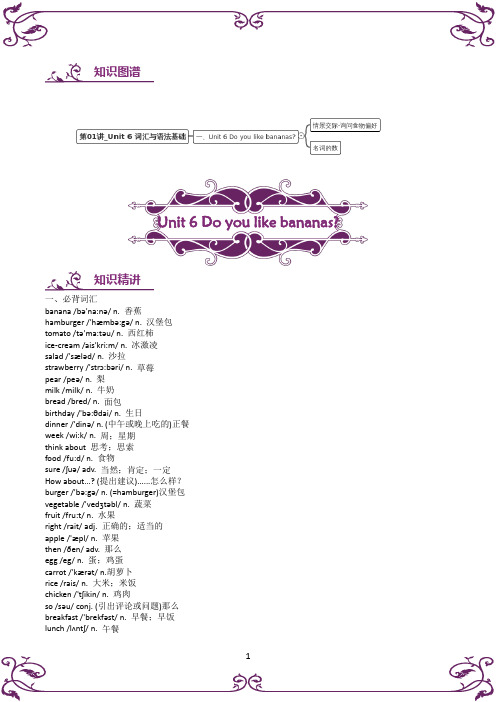
be /bi:/ v.变成
fat /fæt/ adj.肥的;肥胖的
二、重点词汇
1. strawberry noun /ˈstrɔːbər.i/
a small juicy red fruit that has small brown seeds on its surface, or the plant with white flowers on which this fruit grows草莓
B.tomatoes; photos
C.tomatos; photos
D.tomatoes; photoes
例1.2.2词的适当形式填空
There are a lot of new _________ (factory) in our city.
随练1.1---_________ Dale like bananas?
我的膝盖开始疼痛,因此我停下来不再跑了。
I was lost so I bought a street map.
我迷路了,所以买了一张街道地图。
5. healthy adjective /ˈhelθi/
1). strong and well强壮的;健康的
例句:
She’s a nor词汇
banana /bə'na:nə/ n.香蕉
hamburger /'hæmbə:gə/ n.汉堡包
tomato /tə'ma:təu/ n.西红柿
ice-cream /ais'kri:m/ n.冰激凌
salad /'sæləd/ n.沙拉
strawberry /'strɔ:bəri/ n.草莓
人教版英语七年级上册Unit6【重点短语+词法语法句法精讲】

【课堂笔记】人教版英语七年级上册Unit6常用词组1. my birthday dinner 我的生日宴会2. vegetable salad 蔬菜沙拉3. two tomatoes 两个西红柿4. eat well 吃得好5. think about 思考;思索6. eat/have breakfast/lunch/dinner吃早/中/晚饭7. a sports/volleyball star 一位运动/排球明星. next/this/last week 下/这/上星期9. ask sb. about sth. 问某人关于某事10. like hamburgers/ice-cream喜欢汉堡包/冰激凌11. like eating eggs 喜欢吃鸡蛋12. her eating habits 她的饮食习惯13. like chicken for dinner 喜欢吃鸡肉当作晚饭14. one last question 最后一个问题15. healthy food 健康的食物16. after breakfast/lunch/dinner 早/中/晚饭后17. want to be fat/healthy 想要变胖/健康1. have bread for breakfast 早饭吃面包19. a lot of strawberries=lots of strawberries=many strawberries许多草莓20. a lot of rice=lots of rice=much rice许多米饭重点句型1. —Do you like salad? 你喜欢沙拉吗?—Yes, I do./No, I don't.是的,我喜欢。
/不,我不喜欢。
2. —Does she like tomatoes? 她喜欢西红柿吗?—No, she doesn't. She doesn't like them.不,她不喜欢。
Unit+6+知识点归纳 人教版英语七年级上册

Unit 6◆短语归纳1.看电视watch TV2.看报纸read a newspaper =read newspapers3.明天的报纸tomorrow’s newspapers=the newspaper tomorrow4.与某人通过电话交谈talk to sb. on the phone5.听音乐listen to music6.使用电脑学习use the computer to learn7.用A去做B(3)use A to do B =use A for (doing) B =do B with Ae.g. 我们可以用笔写。
We can use pens to write. =We can use pens for writing.=We can write with pens.8.一本有用的书 a useful book9.听一张唱片listen to a CD.10.学习英语learn\study English11.学习弹钢琴learn to play the piano12.研究科学study science13.做汤make soup=cook soup14.喝汤eat\have soup (不用drink)15.洗餐具wash\do the dishes16.洗衣服wash some clothes \ do some washing17.去购物go shopping \去游泳go swimming \去跳舞go dancing18.购物do some\the shopping19.去看电影go to the movies=go to the cinema=go to see a film20.出去吃饭eat out21.没什么not much =nothing much22.和某人一起做某事join sb. for sth.和我们一起吃晚饭join us for dinner23.沏茶make tea \ 喝茶drink tea24.我很乐意(接受邀请)I’d love to=I’d like to25.我愿意做某事I’d love / like to do sth.26.在游泳池里游泳swim in the swimming pool27.赛车 a car race (race—速度型比赛)28.篮球比赛 a basketball game (game---竞技型、技术型比赛)29.在电视上看龙舟比赛watch the boat races on TV30.与她的祖父母生活\居住在一起live with her grandparents31.包粽子make zongzi32.给她的小孩读故事read a story to her young child33.备考\为考试学习study for the test34.寄宿家庭host family35.端午节the Dragon Boat Festival36.儿童节Children’s Day37.任意一个晚上any other night (any other+可数名词单数)38.任何一个男孩any other boy (any other+可数名词单数)39.想念他的家人miss his family40.错过校车miss the school bus41.错过看那场球赛miss watching that soccer game42.希望做某事wish to do sth. =hope to do sth.43.希望(某人)做某事wish (sb) to do sth (hope×)44.送给你最好的祝福best wishes to you45.打扫客厅clean the living room46.许多男老师many men teachers47.两名男学生two boy students◆句型归纳1.你在做什么?—What are you doing?我在看电视。
最新人教版七年级上册英语知识点全第六单元unit6知识点.docx
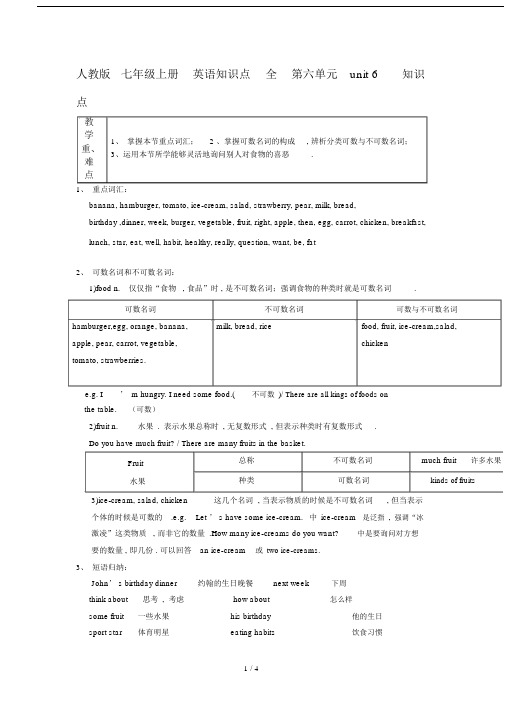
人教版七年级上册英语知识点全第六单元unit 6知识点教学重、难点1、掌握本节重点词汇; 2 、掌握可数名词的构成, 辨析分类可数与不可数名词;3、运用本节所学能够灵活地询问别人对食物的喜恶.1、重点词汇:banana, hamburger, tomato, ice-cream, salad, strawberry, pear, milk, bread,birthday ,dinner, week, burger, vegetable, fruit, right, apple, then, egg, carrot, chicken, breakfast,lunch, star, eat, well, habit, healthy, really, question, want, be, fat2、可数名词和不可数名词:1)food n.仅仅指“食物, 食品”时 , 是不可数名词;强调食物的种类时就是可数名词.可数名词不可数名词可数与不可数名词hamburger,egg, orange, banana,milk, bread, rice food, fruit, ice-cream,salad, apple, pear, carrot, vegetable,chickentomato, strawberries.e.g. I’ m hungry. I need some food.(不可数)/ There are all kings of foods onthe table.(可数)2)fruit n.水果.表示水果总称时, 无复数形式 , 但表示种类时有复数形式.Do you have much fruit? / There are many fruits in the basket.Fruit水果3)ice-cream, salad, chicken总称不可数名词much fruit许多水果种类可数名词kinds of fruits这几个名词 , 当表示物质的时候是不可数名词, 但当表示个体的时候是可数的.e.g. Let ’ s have some ice-cream.中ice-cream是泛指,强调“冰激凌”这类物质, 而非它的数量 .How many ice-creams do you want?中是要询问对方想要的数量 , 即几份 . 可以回答an ice-cream或two ice-creams.3、短语归纳:John’ s birthday dinner约翰的生日晚餐next week下周think about思考,考虑how about怎么样some fruit一些水果his birthday他的生日sport star体育明星eating habits饮食习惯for breakfast作早餐for dinner作晚餐one last question最后一个healthy food健康的食品3、 tomato可数n.“西柿”复数形式:tomatoes似的以o 尾的名 , 需加– es 构成复数形式的有potato, hero 但 photo 等而是以加—s 构成复数形式的.可以:有生命的名, 复数尾加-es,e.g. potato,hero;无生命的尾加-s,e.g. photo.4、某人的喜好, 通常用一般疑句:Do/does +主+ like +⋯?句型.肯定回答用: Yes, 主 + do/does.否定回答用: No, 主 + don ’ t /doesn’ t.(其中,do/does助).----Do you like the sweater ?----Yes, I do.----Does he like the pen ?----No, he doesn’ t.5、 Do you like bananas?1)bananas是banana的复数形式,表示一事物;在英中, 常用复数形式表示一事物 , 其前不用定冠the.2)like sb./sth.喜某人或某物 e.g. I like this ruler?/I like them.like to do sth.喜做某事(表示一次性的或不常的喜) e.g. She likes to play with her little sister.like doing sth.喜做某事(常性的喜) e.g. He likes playing the guitar.5、 Hey, John ’ s birthday dinner is next week翰的生日宴会在下周.1)John’ s birthday dinner翰的生日宴会.John ’s 是名所有格形式, 用于表示所属关系 .e.g. This is Jim’ s sister./It is Tom’s pen.2)next week下周e.g. Teacher’ s Day is next week.6、 think about考e.g. Let’ s think about the eggs./ Let’ s think about the food.7、 Howabout ⋯?====What about ⋯ ?⋯⋯怎么?, 用于提出建或求. 其中 about 是介, 后接 n./ pron./v-ing.e.g. How about him? / How about having some bread?展:英中常用于提建的句型有:1)Let’ s⋯ .我⋯⋯吧. e.g. Let’ s have some apples.2) Why not⋯?什么不⋯⋯呢? e.g. Why not ask our teacher?8、some “一些” , 用于修饰可数名词, 也可用来修饰不可数名词 . 一般用于肯定句中 . 但当表示建议或请求 , 并希望对方给予肯定回答时 , 句中也用 some, 而不用 any.any 一般用于否定句疑问句中.e.g. I have some apples./He has some milk./Would you like some orange juice?I don’t have any pears./Do you have any milk?9、 Let ’ s have strawberries and apples then.1)strawberries是可数名词strawberry的复数形式,其变化是将词尾y 变为 I, 再加 es.2)have v. “有 , 吃、喝” . 英语中 , 习惯上用have breakfast/lunch/supper/dinner来表示吃早饭、午饭、晚饭. 表示吃具体食物时, 可与 eat 替换 .e.g. Let’ s have /eat some apples.10、 so 连词 , “因此 , 所以”不可与because 同时出现在一个句子中 .e.g. I’ m ill today, so I can’t go to school.11、 well adv“好” , 在课文中是修饰动词eat.】辨析 well和 good两者都意为“好” ,但其用法不同 .形容词放在连系动词后 , 表达“健康的”意思I ’ m very well.我很好 .well副词修饰动词We eat well. 我们吃的很好 .good形容词放在名词前作定语 , 或放在连系动词后She is a good girl.作表语12、 for prep.“为 , 替 , 给”可以表示用途、对象、目的、愿望, 等 .e.g. Let’s get a new light for the bedroom./ let’s go out for a walk./Good luck for you.( )Mary often has eggs and bread _____breakfast.A. with B. for C. on13、 really adv.“事实上 , 真正地” , 用于加强语气 , 表示程度 , 放在动词前 .real adj. “真的”e.g. I really don’ t know./Hi, Joe, is it really you?That is not her real name.14、 after dinner用餐后dinner n.“正餐 , 晚餐”常用来表示一天中的正餐( main meal ) , 英语国家晚餐一般是一天中最丰富的一餐, 因此 dinner常用来指晚餐 . 而 supper 只指晚餐 . 此外 ,dinner 一词比较正式 , 邀请朋友赴宴常用它 .e.g. We ’ ll have dinner together in the evening.15、 want v.“想”1 ) want sth.想要某物 e.g. I want an apple.2)want to do sth.想要去做某事 e.g. I want to eat an apple.3)want sb. to do sth.想要某人做某事 e.g. I want you to help me.。
人教版英语七年级上册Unit6知识点总结
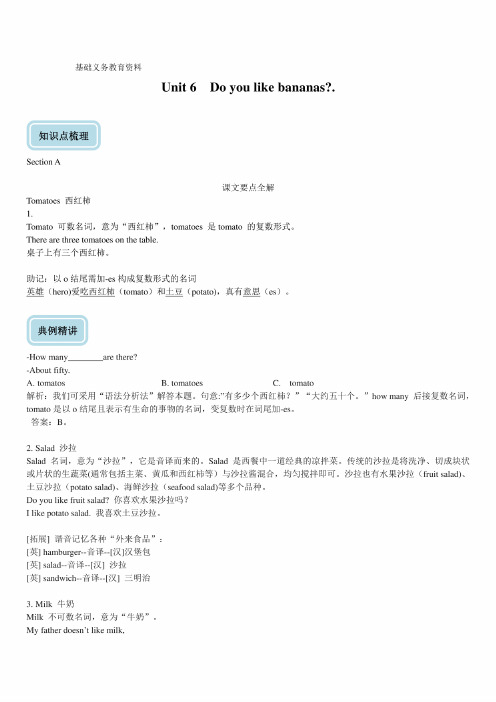
基础义务教育资料Unit6Do you like bananas?.知识点梳理Section A课文要点全解Tomatoes西红柿1.Tomato可数名词,意为“西红柿",tomatoes是tomato的复数形式。
There are three tomatoes on the table.桌子上有三个西红柿。
助记:以o结尾需加-es构成复数形式的名词英雄(hero)爱吃西红柿(tomato)和土豆(potato),真有意思(es)。
典例精讲-How many are there?-About fifty.A.tomatosB.tomatoesC.tomato解析:我们可采用“语法分析法”解答本题。
句意:”有多少个西红柿?”“大约五十个。
”how many后接复数名词, tomato是以o结尾且表示有生命的事物的名词,变复数时在词尾加・es。
答案:Bo2.Salad沙拉Salad名词,意为“沙拉”,它是音译而来的。
Salad是西餐中一道经典的凉拌菜。
传统的沙拉是将洗净、切成块状或片状的生蔬菜(通常包括主菜、黄瓜和西红柿等)与沙拉酱混合,均匀搅拌即可。
沙拉也有水果沙拉(fruit salad)、土豆沙拉(potato salad)>海鲜沙拉(seafood salad)等多个品种。
Do you like fruit salad?你喜欢水果沙拉吗?I like potato salad.我喜欢土豆沙拉。
[拓展]谐音记忆各种“外来食品”:[英]hamburger-#译--[汉]汉堡包[英]salad--音译--[汉]沙拉[英]sandwich-音译-[汉]三明治k牛奶Milk不可数名词,意为“牛奶”。
My father doesn't like milk,我父亲不喜欢牛奶。
[拓展]milk作动词,意为“挤(牛、养等的)奶”。
He is milking a cow.他正在挤牛奶。
典例精讲There is some in the fridge.It's fresh.kB.applesC.egg解析:我们可以采用“综合分析法”解答本题。
- 1、下载文档前请自行甄别文档内容的完整性,平台不提供额外的编辑、内容补充、找答案等附加服务。
- 2、"仅部分预览"的文档,不可在线预览部分如存在完整性等问题,可反馈申请退款(可完整预览的文档不适用该条件!)。
- 3、如文档侵犯您的权益,请联系客服反馈,我们会尽快为您处理(人工客服工作时间:9:00-18:30)。
Unit 6 Do you like bananas?.知识点梳理Section A课文要点全解1.Tomatoes 西红柿Tomato 可数名词,意为“西红柿”,tomatoes 是tomato 的复数形式。
There are three tomatoes on the table.桌子上有三个西红柿。
助记:以o结尾需加-es构成复数形式的名词英雄(hero)爱吃西红柿(tomato)和土豆(potato),真有意思(es)。
典例精讲-How many________are there?-About fifty.A.tomatosB. tomatoesC. tomato解析:我们可采用“语法分析法”解答本题。
句意:”有多少个西红柿?”“大约五十个。
”how many 后接复数名词,tomato是以o结尾且表示有生命的事物的名词,变复数时在词尾加-es。
答案:B。
2.Salad 沙拉Salad 名词,意为“沙拉”,它是音译而来的。
Salad 是西餐中一道经典的凉拌菜。
传统的沙拉是将洗净、切成块状或片状的生蔬菜(通常包括主菜、黄瓜和西红柿等)与沙拉酱混合,均匀搅拌即可。
沙拉也有水果沙拉(fruit salad)、土豆沙拉(potato salad)、海鲜沙拉(seafood salad)等多个品种。
Do you like fruit salad? 你喜欢水果沙拉吗?I like potato salad. 我喜欢土豆沙拉。
[拓展] 谐音记忆各种“外来食品”:[英] hamburger--音译--[汉]汉堡包[英] salad--音译--[汉] 沙拉[英] sandwich--音译--[汉] 三明治k 牛奶Milk 不可数名词,意为“牛奶”。
My father doesn’t like milk,我父亲不喜欢牛奶。
[拓展] milk 作动词,意为“挤(牛、养等的)奶”。
He is milking a cow. 他正在挤牛奶。
典例精讲There is some_______in the fridge.It’s fresh.A. milkB. applesC. egg解析:我们可以采用“综合分析法”解答本题。
Some “一些”,修饰复数名词或不可数名词。
Milk为不可数名词,apples 为复数名词,egg为可数名词单数,可排除C;根据is 可知,主语为可数名词单数或不可数名词,可排除B,故选A。
答案:A4.bread 面包Bread 不可数名词,意为“面包”,不可与不定冠词a或数词连用。
I only eat bread for breakfast. 我早餐只吃面包。
典例精讲单词拼写They usually have some milk and________(面包)for breakfast.解析:我们可采用“汉语提示法”解答本题。
根据所给汉语提示“面包”可知此处应填“bread”。
句意:他们早餐通常喝些牛奶、吃些面包。
答案:bread5.Do you like bananas? 你喜欢香蕉吗?“Do/Does+主语+like+其他?”为一般疑问句,意为:“......喜欢......吗?”,询问某人的喜好。
肯定回答用“Yes, 主语(人称代词)+do/does.”,否定回答用“No, 主语(人称代词)+don’t/doesn’t.”。
--Do you like the sweater? 你喜欢这件毛衣吗?--Yes, I do.是的,我喜欢。
--Does he like the pen? 他喜欢这支钢笔吗?--No, he doesn’t. 不,他不喜欢。
6.Hey, John’s birthday dinner is next week. 嘿,约翰的生日晚餐在下周。
(1)birthday 可数名词,意为“生日”,是由birth(出生)与day(日子)构成的合成词。
birthday party 生日聚会birthday cake 生日蛋糕(2)dinner 名词,意为“正餐;晚餐”。
泛指“晚餐”时,用作不可数名词,其前不加冠词。
We’ll have dinner together in the evening.晚上我们要一起聚餐。
[拓展] ①一日三餐分别表达为breakfast(早餐),lunch(午餐),dinner/supper(晚餐)。
②与三餐有关的常用短语:At breakfast/lunch/dinner在吃早/午/晚餐Have breakfast/lunch/dinner 吃早/午/晚餐Have sth for breakfast/lunch/dinner 早/午/晚餐吃某物(3)next week 意为“下周”,week 作可数名词,意为“周;星期”。
See you next week. 下周见。
7. Let’s think about the food. 咱们考虑下(吃什么)食物吧。
(1)think about 意为“考虑;思考”,think 为不及物动词,常与介词about 连用,其后可接名词、代词或动词-ing 形式。
You must think about your family.你必须考虑下你的家人。
(接名词)--What about having dinner with us this evening?今天晚上和我们一起共进晚餐怎么样?--Let me think about it.让我考虑考虑。
(接代词)I’m thinking about going to Beijing.我正考虑着去北京。
(接动词-ing形式)(2)food 名词,意为“食物,食品”。
当表示食物的总称时,用作不可数名词,无复数形式。
故作主语时,谓语动词用第三人称单数形式。
I’m hungry. I need some food.我饿了,我需要一些食物。
Some food is on the table.一些食物在桌子上。
注意:food 通常用作不可数名词,但表示特定种类的食物时,food用作可数名词,其复数形式为foods.Rice and chicken are good foods.米饭和鸡肉是很好的食物。
8.Sure 当然可以。
Sure 副词,意为“当然;肯定;一定”,通常用于表示同意他人的建议或请求,相当于certainly,OK,of course。
--Can you give me some milk?你能给我一些牛奶吗?--Sure.当然可以了。
典例精讲---May I use your dictionary for a while?--- _________. It’s on the desk.A.Yes, sureB. Take it easyC. You’ve got itD. Sorry, you can’t解析:我们可以采用“情景交际法”解答本题。
A项意为“好的,当然可以”;B项意为“别着急”;C项意为“你已经知道了”;D项意为“对不起,你不能”。
根据答语后句句意“它在桌子上”可判断此处是同意对方的请求,故选A。
句意:“我可以用一下你的词典吗?”“当然可以。
它在桌子上。
”答案:A9.How about burgers, vegetable salad, and some fruit? 汉堡包、蔬菜沙拉和一些水果怎么样?(1)How about...? 意为“......怎么样?”用于提出建议或请求,相当于“What about...?”,其中about 为介词,其后可接名词、代词或动词-ing 形式。
--Mom, I’m hungry. 妈妈,我饿了。
--Oh, how about some bread?哦,吃些面包怎么样?(接名词)Hoe about him? 他怎么样?(接代词)How about having fish?吃鱼怎么样?(接动词-ing 形式)[拓展]英语中常用于提建议的句型还有:①Let’s ...意为“咱们......吧”。
Let’s have some apples.咱们吃些苹果吧。
②Why not ...?意为“为什么不......呢?”Why not ask our teacher? 为什么不问我们的老师呢?(2)burger 可数名词,意为“汉堡包”,相当于hamburger。
Do you like burgers? 你喜欢汉堡包吗?For breakfast, I eat two burgers.早餐我吃两个汉堡包。
(3)fruit 名词,意为“水果”。
表示水果的总称时,用作不可数名词,无复数形式;表示水果的种类时,用作可数名词,其复数形式为fruits.Do you have much fruit? 你吃很多水果吗?There are many kinds of fruits in the basket.在篮子里有许多种水果。
10. Yes, you’re right. 是的,你是对的。
right形容词,意为“正确的;适当的”,在句中可作表语或定语。
此时right的反义词为wrong(错误的)。
Is he right? 他是正确的吗?(作表语)It’s a right answer.这是一个正确的答案。
(作定语)[拓展] ①right 作形容词,还可意为“右面的”。
此时right的反义词为left(左边的)。
Put up your right hand, please.请举起你的右手。
②right 还可用作名词,意为“右边;右方”。
Take the first turning on the right.在在第一个拐弯处向右拐。
11.I think John likes strawberries and apples. 我想约翰喜欢草莓和苹果。
(1)strawberries 是可数名词strawberry 的复数形式,其变化是将词尾的y变为i,再加es。
类似的单词还有:family(家庭)-families, party(聚会,宴会)-parties。
I like strawberries very much.我非常喜欢草莓。
(2)apple 可数名词,意为“苹果”。
Apple是读音以元音因素开头的单词,其前用不定冠词时,要用an,Is that an apple? 那是一个苹果吗?He doesn’t like apples. 他不喜欢苹果。
典例精讲I like apples.________apple a day keeps the doctor away, you know.A.AB. AnC.TheD. 不填解析:我们可采用“语法分析法”解答本题。
结合选项可知句意为“我喜欢苹果。
